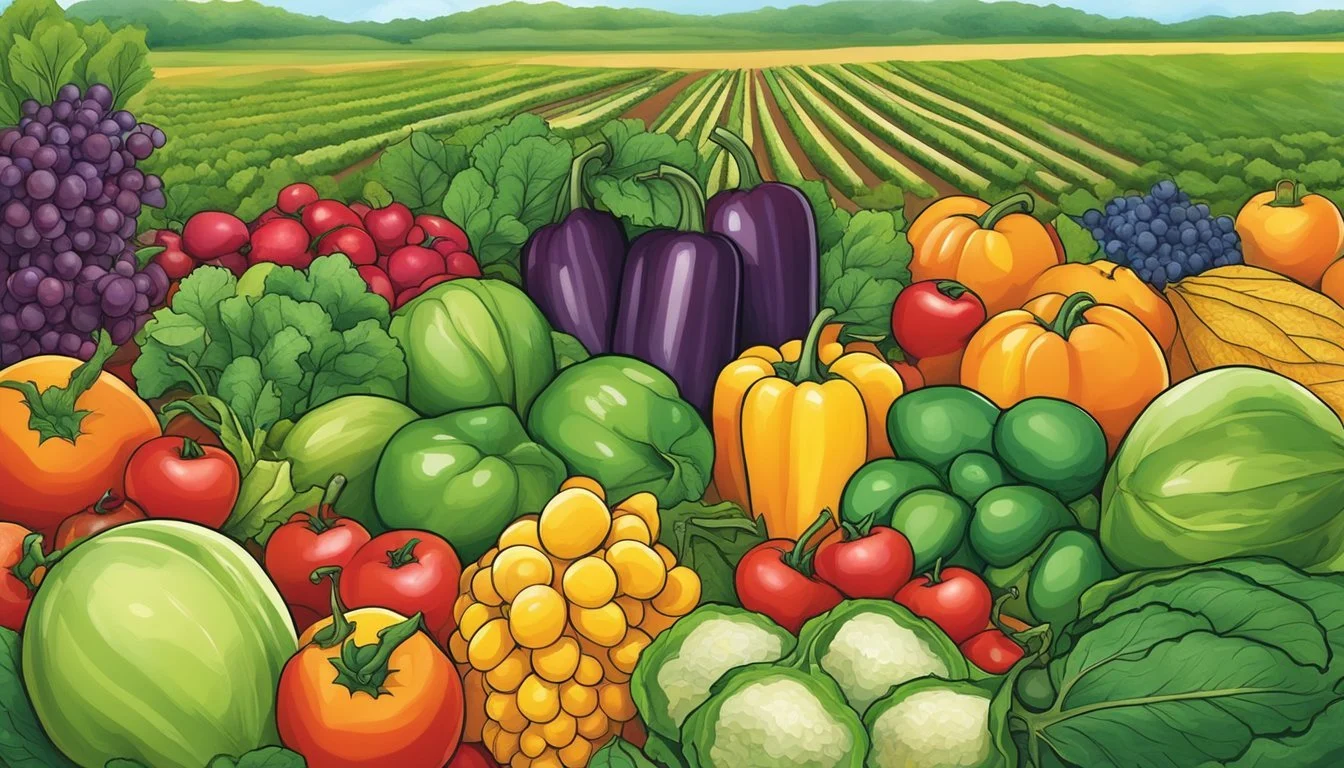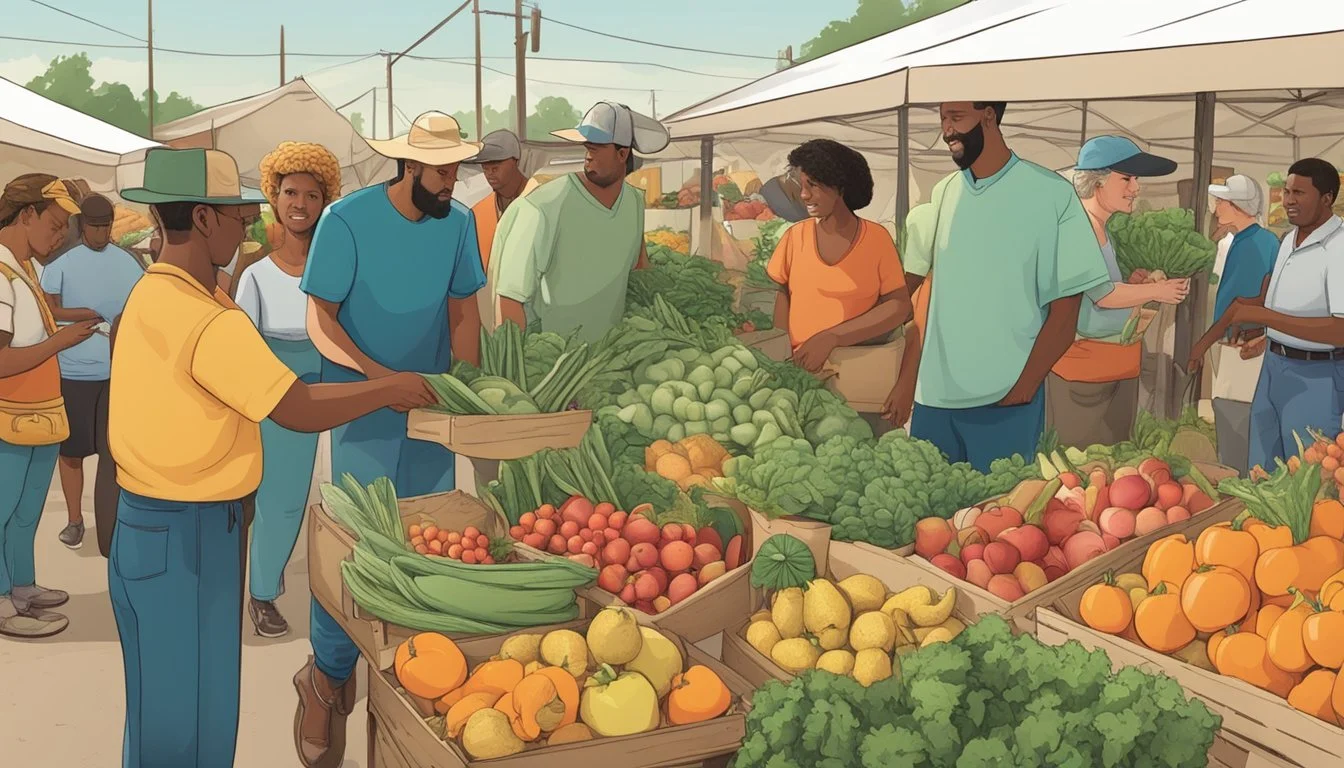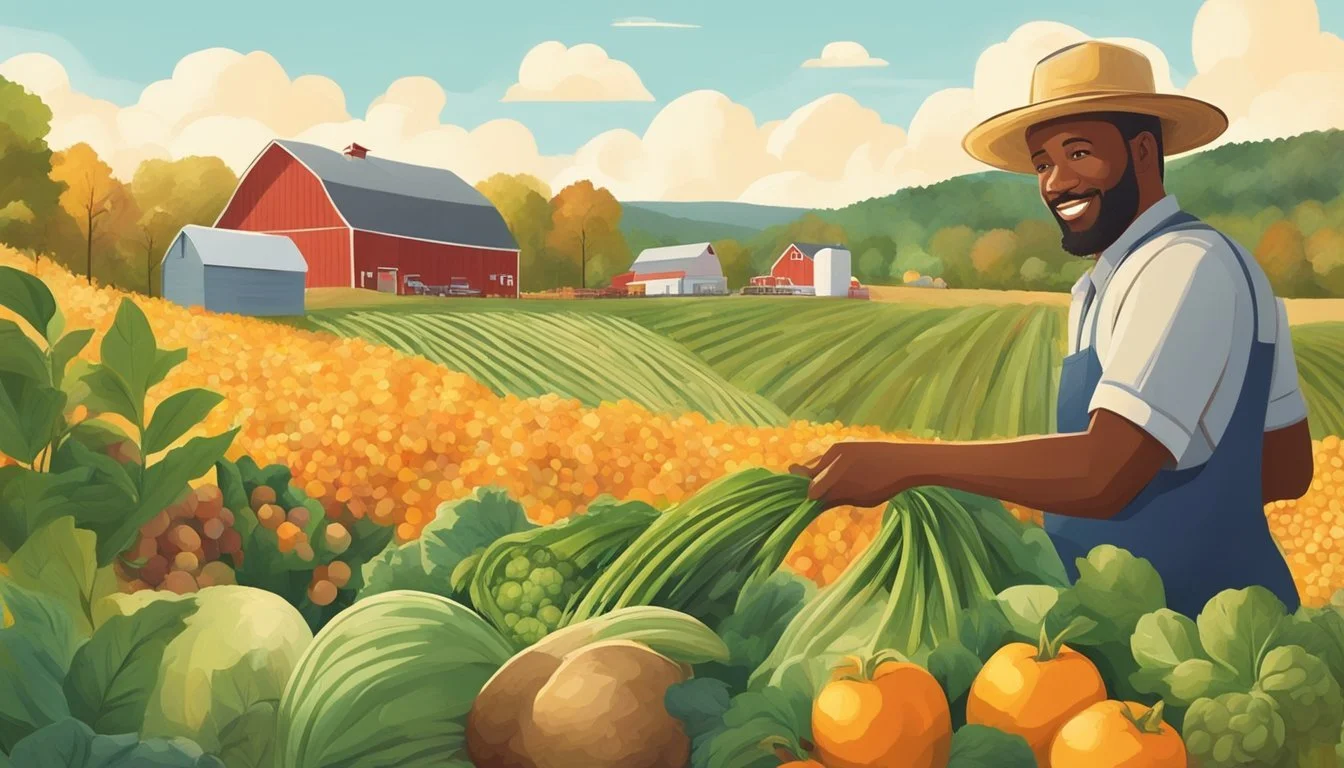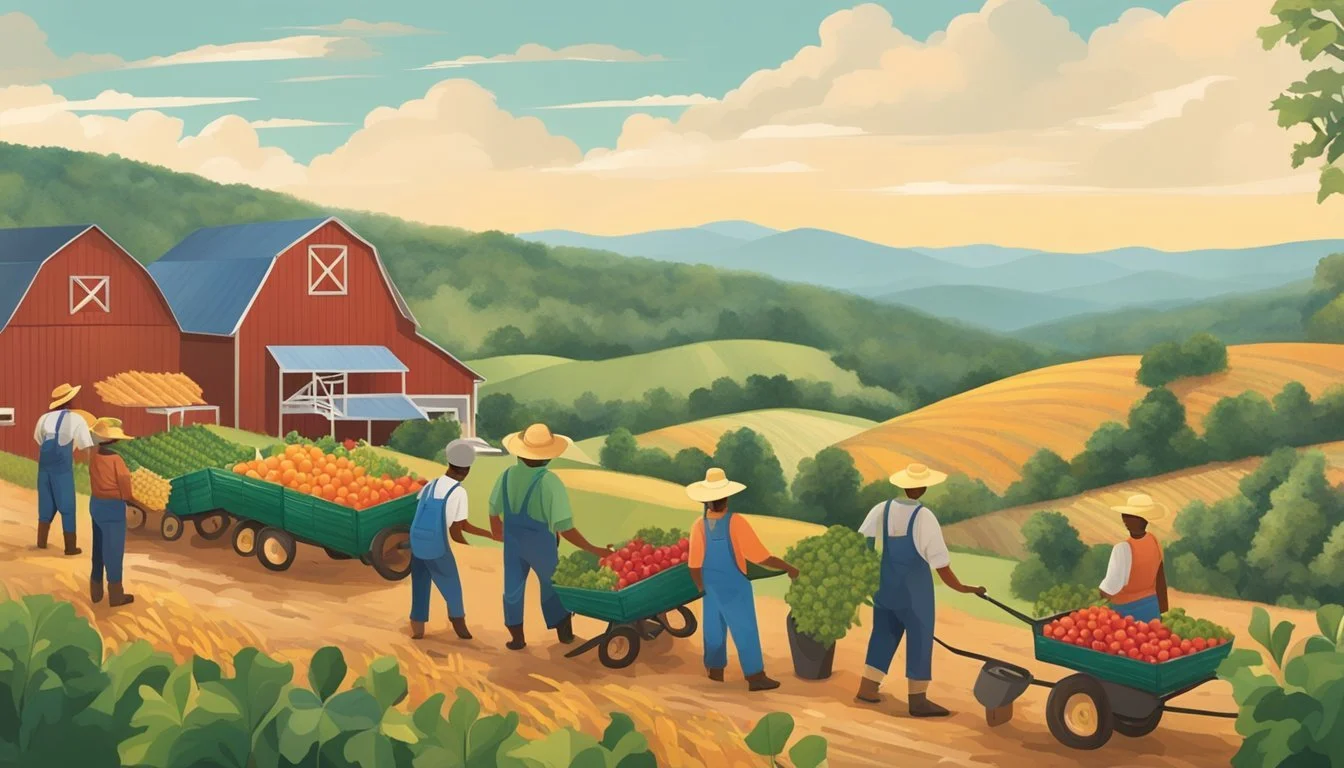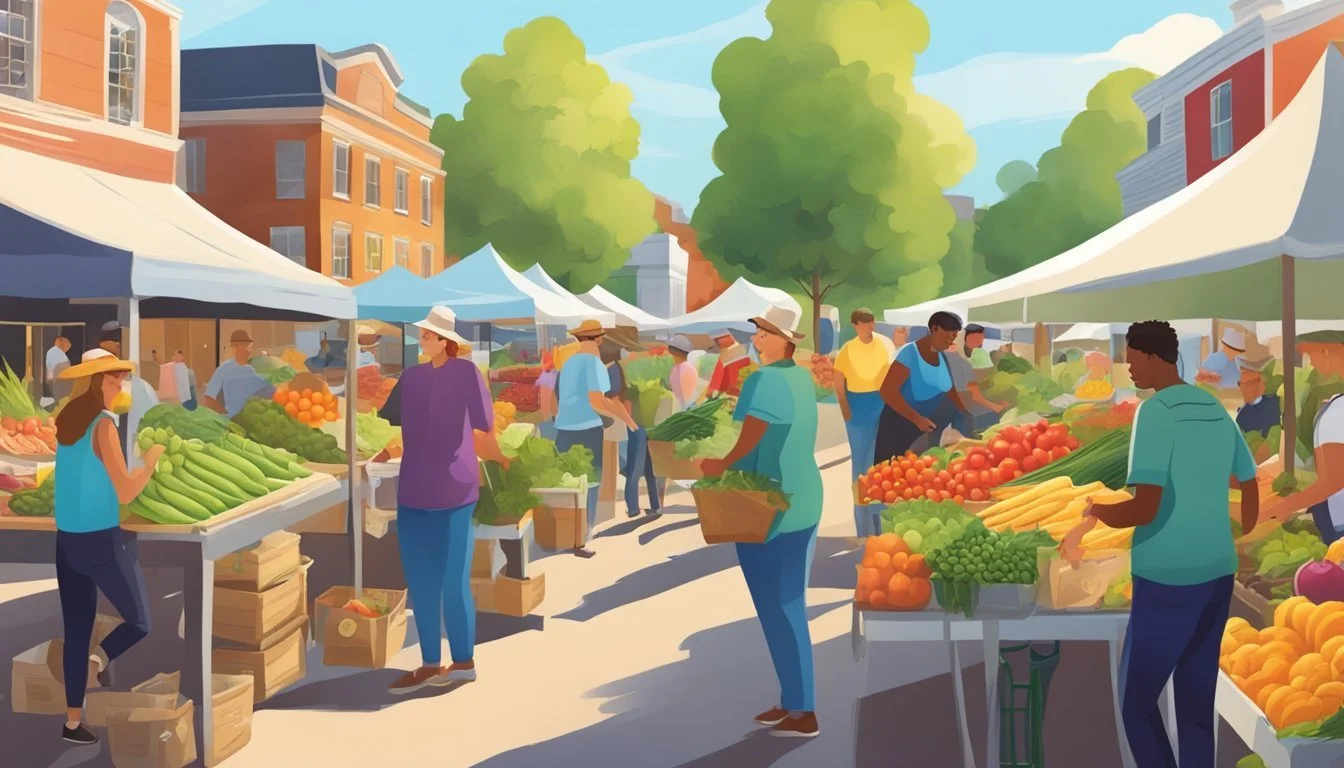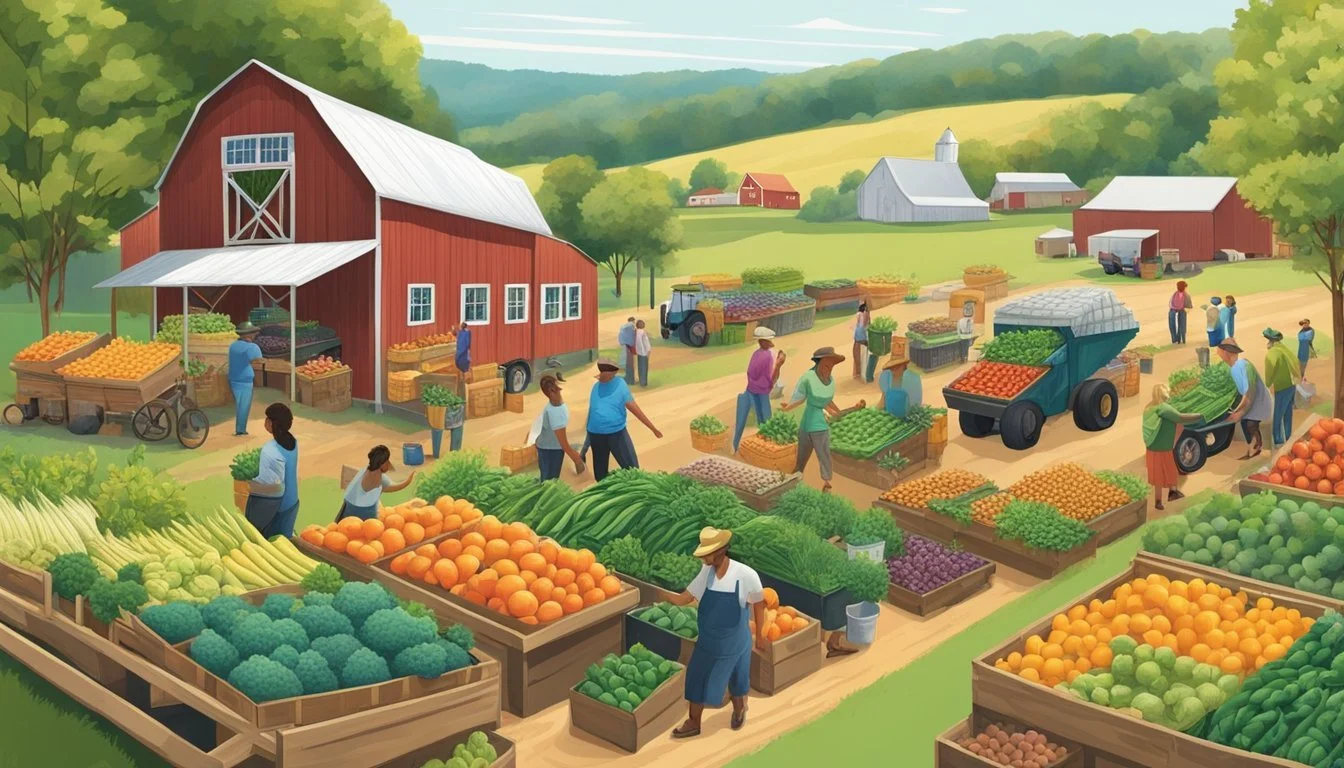Community Supported Agriculture (CSA) in Tennessee
Advancing Local Food Movements
Community Supported Agriculture, commonly known as CSA, presents a model of food production and distribution that links local Tennessee farmers directly with consumers. This system allows consumers to become members of a farm, providing financial support at the beginning of the growing season that entitles them to a share of the harvest. These memberships create a structured market for farmers, assuring them of a dedicated customer base, while members harvest the benefits of regular distributions of fresh, local produce throughout the season.
In Tennessee, the CSA model strengthens the bond between the local community and agriculture by promoting the consumption of seasonal food, supporting local economic stability, and fostering a deeper understanding of where and how food is grown. Consumers appreciate the transparent process, as they know exactly where their food is coming from. This direct farm-to-table approach not only contributes to a smaller carbon footprint due to reduced transportation distances but also encourages healthier, more sustainable eating habits.
Farm memberships in a CSA vary and may include a variety of fresh produce, and often extend to other farm products like eggs, meat, poultry, and even flowers, adapting to consumer needs and enhancing the traditional concept of a CSA. The movement toward local, sustainable food systems is particularly vibrant in Tennessee, where numerous farms offer CSA programs, each with its own unique offerings, sharing the inherent risks and bountiful rewards of farming with their members.
History and Evolution of CSA in Tennessee
The progression of Community Supported Agriculture (CSA) in Tennessee reflects a blend of traditional agriculture with innovative market strategies, facilitating a stronger relationship between local farmers and consumers.
Origins of CSA
The concept of CSA, emphasizing shared risk and reward between farmers and consumers, has its roots deeply embedded in the values of the local food movement. Although the CSA model originated in Japan and Europe in the 1960s, it was introduced to the United States in the 1980s, where it aligned well with the research and education aims of various agricultural institutions looking to support small farms and sustainable practices. In Tennessee, CSA programs began as partnerships where consumers provided up-front funding to local farmers in exchange for a regular share of the harvest, reinforcing the state's agricultural traditions with a collective approach to farming and consumption.
Growth of CSA Farms in TN
By adopting the CSA model, farmers in Tennessee diversified their marketing and distribution methods, which in turn supported the growth of small-scale farms. This direct-to-consumer method has proven beneficial for both farmers seeking stable, upfront capital and eaters desiring fresh, locally-sourced produce. As part of the wider local food movement in the state, CSA farms have grown in number and variety, offering subscriptions for products ranging from produce to meats and dairy. The increase in CSA farms is also tied to a greater emphasis on education, providing consumers with knowledge about farming practices and fostering community engagement. This growth has been accompanied by marketing support from institutions like the Tennessee State Government's Business Development Division, further solidifying the presence of CSA in the region's agricultural landscape.
Understanding CSA Models
Community Supported Agriculture (CSA) in Tennessee offers diverse models, each emphasizing a unique relationship between consumers and producers. They reflect different approaches to the purchasing and distribution of shares of fresh produce, with varying degrees of consumer choice and shared risk.
Share-Based CSA
In the Share-Based CSA model, the consumer commits to a season’s worth of agricultural products by purchasing a share upfront. This model reflects a shared commitment where both the farmer and the consumer partake in the risks and rewards of farming. Consumers typically receive a fixed box of produce each week, which is an assortment of what the farm is currently harvesting. The contents are determined by the farmer, fostering an authentic seasonal eating experience.
Benefits:
Predictable income for farmers at the start of the season
A direct connection between farmers and consumers
Shared risk, as consumers invest in the farm's yield
Subscription-Based CSA
The Subscription-Based CSA operates on a periodic payment system, where consumers pay for a subscription that provides them with a weekly or bi-weekly supply of farm produce. This approach may offer more flexibility compared to the Share-Based model, as consumers can often opt in or out throughout the season. It might sometimes allow for customization of the share contents.
Benefits:
Flexibility in subscription terms
Potentially more consumer choice in produce selection
Reduced upfront cost and less shared risk
Market-Style CSA
Market-Style CSA is designed to combine the traditional CSA model with the flexibility of a farmers' market. Consumers are typically given a budget or "credits" that they can use at the farm stand to select the produce they prefer. This model provides a high degree of choice to consumers and minimizes food wastage, as they only take what they need or want.
Benefits:
High level of consumer choice and flexibility
Reduced shared risk due to consumer-driven demand
Potential reduction in food waste as consumers select only what they will use
Each CSA model presents a distinct method of supporting local agriculture, facilitating community-connected food systems, and managing shared risk. Tennessee's CSA frameworks embody the principles of sustainable and community-focused agriculture.
Benefits of CSA for Consumers
Community Supported Agriculture (CSA) provides consumers in Tennessee with various benefits, ranging from access to ultra-fresh food to fostering local farm sustainability.
Fresh Produce and Nutrition
Consumers receive a bundle of fresh produce, often harvested within just a day of delivery. This means individuals benefit not only from the flavor of ultra-fresh food but also from the vitamin benefits that are at their peak in freshly harvested produce.
Supporting Local Farms
By participating in a CSA, consumers are directly putting money into the pockets of local farmers. This helps ensure the economic stability of the region's agriculture and maintains farming as a viable livelihood.
Building Community Relationships
CSA members often have opportunities to visit the farms and meet the people behind their food. This builds community relationships and gives consumers insight into the local agricultural scene.
Exploring New Vegetables and Ways of Cooking
As part of a CSA, consumers are introduced to an array of new vegetables that they might not typically purchase. This encourages exploring new ways of cooking, expanding their culinary repertoire and dietary diversity.
Benefits of CSA for Farmers
Community Supported Agriculture offers tangible perks for farmers, such as financial stability, marketing opportunities, and strengthened ties with local consumers.
Predictable Income Stream
Community Supported Agriculture provides farmers with a predictable income stream. Through the subscription model, where consumers pay in advance of the growing season, farmers have the reassurance of secured funds. This early cash flow can be integral for planning and sustaining farm operations, aiding in the purchase of seeds, equipment, and other necessary supplies before the season begins.
Marketing Advantages
Participation in a CSA yields significant marketing advantages for farmers. They can capitalize on direct sales without needing to invest heavily in traditional advertising or distribution channels. The direct connection with their consumers allows them to build a loyal customer base. Furthermore, as CSA emphasizes local, seasonal produce, it naturally aligns with the growing consumer trend towards supporting regional agriculture.
Community Engagement
CSA fosters community engagement, placing farmers at the heart of a local food movement. This relationship enhances the community-farmer bond and instills a shared responsibility for food production. By interacting directly with members, farmers can receive immediate feedback, which can inform future growing decisions. The communal aspect of CSA also provides a platform for education about sustainable practices and the importance of supporting local agriculture.
How to Join a CSA in Tennessee
Joining a CSA in Tennessee allows consumers to access fresh produce directly from local farms. They offer a plethora of benefits including a variety of farm products, flexible pick-up options, and often, delivery services to areas such as Nashville, Brentwood, and Franklin.
Choosing the Right CSA
When selecting a CSA in Tennessee, consumers should consider the proximity of the farm to their home or preferred pick-up location. A diverse range of farm products is typically available, often including not just vegetables, but herbs, berries, and sometimes meats. The following points are essential for potential members:
Location: Identify CSAs with convenient pick-up points or delivery options.
Product Range: Ensure the share includes the types of produce you enjoy and want to cook with.
Understanding Membership Terms
Before committing to a CSA membership, one must understand the terms clearly. Memberships often require an upfront fee, which directly supports the farm's operations for the season. Here are critical membership aspects to know:
Fees: Members pay in advance, providing financial support to the farm.
Seasonality: Expect a box of farm products regularly during the growing season.
Delivery: Some CSAs offer delivery services to certain areas, which may include additional fees.
Pick-up Schedule: Members should confirm weekly pick-up details to plan accordingly.
By understanding these elements, consumers can embark on a sustainable and community-supportive culinary journey with a local Tennessee CSA.
Seasonal Availability and Produce Variety
In Tennessee, Community Supported Agriculture (CSA) programs offer a wide range of locally sourced products that reflect the seasonal nature of farming. Consumers can expect fresh, diverse varieties of produce, and more throughout the various harvest cycles of the region.
Typical CSA Offerings
A typical CSA in Tennessee provides a vivid array of vegetables, fruit, and additional farm products like meat, eggs, cheese, and flowers. Depending on the particular farm, members might also receive herbs, berries, and melons. Here is a snapshot of the produce variety usually available:
Vegetables: Tomatoes, cucumbers, peppers, leafy greens, and root vegetables.
Fruit: Apples, peaches, and pears when in season.
Berries: Strawberries in the spring, blueberries, and blackberries in early summer.
Herbs: Basil, mint, cilantro, and dill are often included.
Flowers: Some CSAs offer bouquets of seasonal flowers.
It is common for CSA shares to vary as the seasons progress, ensuring participants receive the freshest produce at its peak flavor and nutritional value.
Seasonal Harvest Cycles
Tennessee's seasonal harvest cycles dictate what and when produce is available. These cycles are vital to understanding CSA offerings through the year. The table below outlines when various CSA products are generally harvested:
Season Harvest Products Spring Leafy greens, herbs, radishes, strawberries. Summer Full variety of vegetables, melons, berries, stone fruit. Fall Apples, root vegetables, hearty greens, pumpkins. Winter Limited selection; mainly storage crops and greenhouse-grown produce.
CSA members enjoy the summer's bounty but also appreciate winter offerings like stored apples, winter squash, and even greenhouse-grown greens. This reflects a commitment to sustainable agriculture and community support throughout the year.
Challenges and Considerations
In Tennessee, the Community Supported Agriculture (CSA) model has shown growth, but it presents unique challenges both for farmers and consumers. These challenges center around managing expectations and the inherent risks associated with weather and crop production.
Managing Expectations
CSAs require clear communication to align what consumers expect with what farmers can realistically provide. Farmers must be transparent about crop varieties and delivery schedules, while consumers need to understand the shared risk involved in the CSA model. This partnership means that consumers share in both the bounty and the scarcity that may come from each season’s yield.
Transparent communication about:
Crop varieties
Delivery schedules
Weather and Crop Risks
Weather variability poses significant risks to CSA operations. Unexpected weather events can lead to crop failures, which directly impact the availability of produce for consumers. In Tennessee, this risk is shared between the farmer and the consumer. Farmers must employ strategies to mitigate these risks, such as crop diversification and employing sustainable farming practices.
Strategies to mitigate weather risks:
Crop diversification
Sustainable farming practices
Farmers engaged in CSA in Tennessee must carefully navigate these challenges and consider the best approaches to foster sustainable, long-term relationships with their CSA members.
Regional CSA Spotlight
Tennessee's Community Supported Agriculture scene thrives with a variety of CSA programs meeting the demands for fresh, local produce. From the fertile fields of Bells Bend to the rolling hills of College Grove, CSAs across the region offer a direct connection between consumers and their food.
Profiles of Prominent Tennessee CSAs
Bells Bend: Located near Nashville, Bells Bend Farms operates a successful CSA, offering fresh vegetables, fruits, and flowers with pickup options in the city.
College Grove: Nestled within this community is Delvin Farms, known for their organic produce. They've been providing CSA members with seasonal selections that highlight the area's agricultural diversity.
Goodlettsville: In this area, Madison Creek Farms stands out with their organic offerings and commitment to sustainable farming practices reflected in their CSA.
Peaceful Pastures: They have built a reputation in Brentwood for its ethically raised meats. Their CSA includes a range of meat products, from beef to poultry.
Bloomsbury Farm: Situated near Smyrna, this farm is recognized for organic produce and their unique CSA which also includes free-choice u-pick options for members.
Bountiful Blessings Farm: Located in Williamsport, this farm extends its CSA membership to include heirloom varieties and a wide range of organic vegetables.
Myers Farm Beef: Focused on grass-fed beef, this CSA in Brentwood is known for high-quality meats with a focus on sustainability and animal welfare.
Doe Run Farm: Rooted in College Grove, their CSA program emphasizes a partnership between the farmer and the community through shared risk and reward.
Red Boiling Springs: The town is home to small-scale operations that contribute to the regional CSA landscape, emphasizing local agriculture's importance.
It is clear that Tennessee's rich agricultural tapestry offers a wide range of CSA options, with each one providing a unique window into the state's commitment to local, sustainable farming.
Community Engagement and Education
Community Supported Agriculture (CSA) initiatives in Tennessee actively bridge the gap between farms and local communities. Through various educational efforts, these programs aim to foster a deeper understanding of sustainable agriculture.
Workshops and Farm Events
CSA programs frequently host workshops that engage community members in the hands-on learning of sustainable farming practices. Through these events, individuals gain practical insights into the seasonality of produce and the effort required to cultivate it. Farms like Green Door in Nashville offer opportunities to participate in events where community members can learn about organic farming methods and the benefits of local produce.
Social Media and Outreach
CSAs utilize social media platforms such as Facebook to connect with the community. These platforms serve as vital tools for sharing information about upcoming events, available produce for the week, and educational content. Regular updates on Facebook create a feedback loop that enhances community participation and spreads knowledge about the farm's activities and CSA offerings.
Educational Programs for Schools
Educational programs targeted towards schools are integral in CSAs. They introduce students to where their food comes from and the importance of local farming ecosystems. Engagement with schools often includes farm visits, where students can experience the daily operations of the CSA and educational materials that can be incorporated into their curricula, promoting the importance of sustainable agriculture from a young age.
The Economic Impact of CSA
Community Supported Agriculture (CSA) contributes significantly to the Tennessee economy, primarily through direct support of local agriculture and ancillary benefits to surrounding businesses.
On Local Agriculture
Local farms in Tennessee gain stable, upfront funding by adopting the CSA model, enhancing their financial security. Growers receive early-season capital from members who purchase shares, which enables them to plan for the production season with greater confidence. This model reduces the risk of unsold produce and provides a guaranteed market. As a result, local agriculture is fortified by a predictable revenue stream. Producers can invest in quality seeds, sustainable farming practices, and labor without the usual financial uncertainty associated with traditional farming operations.
On Surrounding Businesses
Businesses peripheral to agriculture also benefit from the CSA model. For example, local supply stores may see increased sales as growers invest in farming equipment and inputs required for an assured production process. Furthermore, the presence of CSAs often encourages the development of related services, such as food processing or distribution companies that specialize in local food handling. This engagement broadens the economic impact—stimulating job creation and circulating money within the community, fostering a robust local economy centered around sustainable agricultural practices.
Future Prospects of CSA in Tennessee
Community Supported Agriculture (CSA) in Tennessee is poised for growth with an increasing interest in local, sustainable food sources.
Innovation and Trends
Tennessee's CSA programs are exploring revolutionary methods to connect consumers with local agriculture. This involves deploying technology for better customer engagement and integrating novel farming practices to enhance crop diversity. Research in the field is leading to innovations such as online subscription platforms and the use of social media for real-time farm updates. These trends suggest a future where CSA becomes more mainstream, and technology aids in scaling the CSA model effectively.
Online subscription platforms are being increasingly adopted for ease of access and management.
Social media is used for marketing, allowing farmers to share stories and connect with community.
Sustainability and Environmental Impact
The emphasis on Sustainability is a critical driving force for CSAs in Tennessee. The synergy between sustainable agriculture practices and the reduction of food miles contributes positively to the environment. Understanding the ecological benefits of localizing food systems, Tennessee CSAs are likely to strengthen their operations around sustainability. Research indicates that the adoption of organic methods and investments in soil health can lead to resilient farming ecosystems.
Organic methods: Emphasizing non-chemical farming to protect the environment.
Investments in soil health: Commitment to sustainable practices that ensure long-term productivity.

